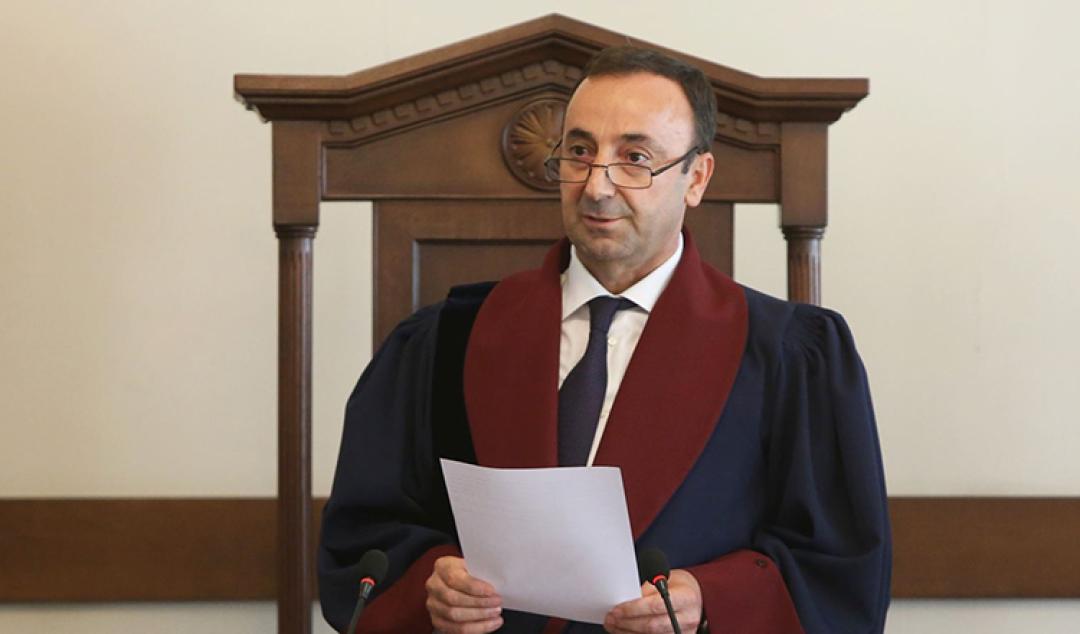
President of Armenian Constitutional Court charged with abuse of power

On 27 December, the President of the Constitutional Court (CC) of Armenia Hrayr Tovmasyan had been charged under Part 2 of Article 308 of the Criminal Code of Armenia (abuse of power, resulting in negligence in grave consequences), reported Sputnik Armenia.
Earlier, the Special Investigative Service of Armenia (SIS) entered the Constitutional Court building in order to interview Tovmasyan. After the questioning, Tovmasyan told the press that he refused to give any testimonies. "The investigator said he had never seen… a defendant in his life to be in such a mood… I was warned about it six months ago that 'you will be charged one day for not doing the 'x', ' y ', 'z' steps. The 'x', ' y ', 'z' steps were to submit my resignation. Putting this accusation (…) on has not changed and cannot change anything in my life,” Tovmasyan said.
He emphasized that the CC has been working under unprecedented pressure for the last 6-7 months. “Those pressures have involved not only insults, threats and warnings about [what happened] today but also concrete calls for violence. But in that timeframe, the CC, glory and honour to all the [CC] judges, had worked without any obstacles,“ he added.
A day earlier, the Armenian President Armen Sargsyan signed the package of laws add to laws regarding the functioning, servicing, and social guarantees for officials, which foresees the early retirement of CC judges. The law was passed in the Armenian Parliament two weeks earlier and was criticized by opposition factions and also raised concerns by the Council of Europe Venice Commission (Caucasus Watch reported).
In late October, Armenia’s Investigative Committee claimed to have collected sufficient evidence that Tovmasyan abused his powers when he served as justice minister from 2010-2013. It said that he colluded with a former senior Justice Ministry official, Norayr Panosyan, and officials from Yerevan’s municipal administration to effectively privatize an office in the city centre.
The Investigative Committee sent the case to the SIS for further investigation. Tovmasyan’s legal team categorically rejected the committee’s allegations at the time, calling them “yet another example of illegal pressure exerted on the Constitutional Court chairman in recent months.”
Panosyan, who also denies any wrongdoing, was arrested in late September. Armenia’s Court of Appeals freed him on November 6, questioning the credibility of the accusations levelled against the former official. New charges were brought against Panosyan on 26 December.
The former Armenian Justice Minister Davit Harutyunyan, criticized this move, saying that Tovmasyan’s indicting was a crime because the institute of immunity has been violated. "Hrayr Tovmasyan [was] appointed by the previous constitution and his immunity is valid to the fullest extent, that is to say, without a constitutional court act, charging Hrayr Tovmasyan is a crime,” Harutyunyan said. Harutyunyan noted that the SIS decision should be challenged and appealed to the Armenian Prosecutor General, whose duty is to follow the lawfulness of the case.
The expert on Armenian Constitution, Aram Vardevanyan, stated that the SIS investigation contained elements of criminal prosecution against an untouchable official. “The person does not matter to me here; this building gives me cause for concern and worry. When there are press reports about the CC, in fact, right after the signing of the unconstitutional law that the SIS [Special Investigation Service] and the NSS [National Security Service] are in the CC. How many European countries do you know where representatives of SIS and NSS enter the CC? The CC is a body above the authorities; it is higher than even from any branch of state power. How can the SIS… enter the CC [so easily]?,” he said. And referring to the law on early retirement for the serving judges of the Constitutional Court, Vardevanyan said that the law lacks the principle of volunteerism.
On 20 May, Armenian Prime Minister Nikol Pashinyan called on his supporters to block courthouses in Armenia (Caucasus Watch reported). On the same day, he called an emergency meeting with senior state officials, where he demanded a mandatory “vetting” of all judges in Armenia and said that many of them must resign because of their connections to the country’s former leadership and due to public mistrust.
Since then Pashinyan has repeatedly accused the CC judges of maintaining links with Armenia’s former leadership and impeding reforms which he says are aimed at creating a “truly independent judiciary.” His critics claim that he is on the contrary seeking to gain control over all courts.
See Also


Armenia Records 5.9% GDP Growth in 2024, Missing 7% Goal

Yerevan Balances Strategic Ties with Both US and Russia, Says Foreign Minister

FM Mirzoyan: Peace Deal with Azerbaijan Is Within Reach

Pashinyan and Erdogan Hold Call, Reaffirm Commitment to Ongoing Dialogue

